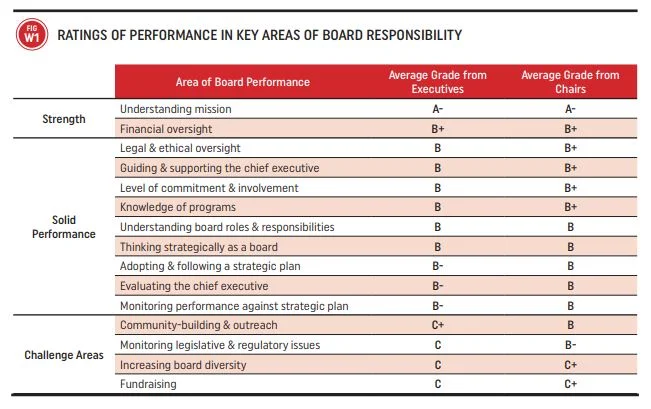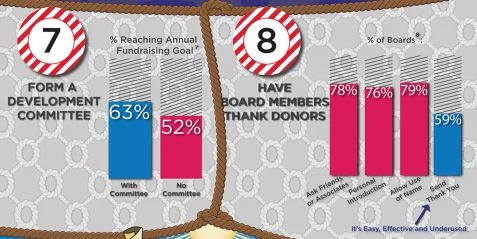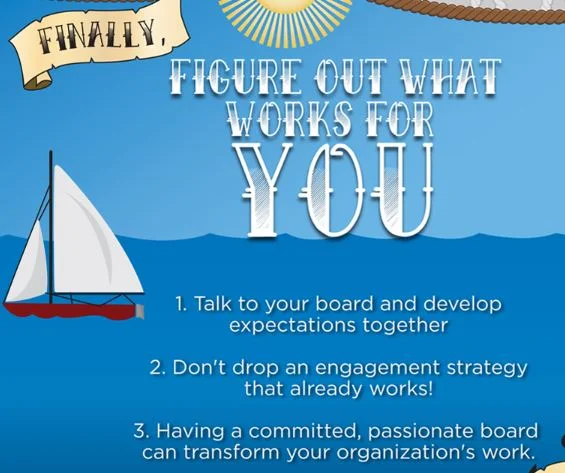COURAGEOUS CONVERSATIONS WE NEED TO HAVE - PART IV - FUNDRAISING MOST OF-TEN SELECTED AS AREA FOR BOARD IMPROVEMENT
COURAGEOUS CONVERSATIONS WE NEED TO HAVE - PART IV - FUNDRAISING MOST OFTEN SELECTED AS AREA FOR BOARD IMPROVEMENT
Andrea McManus, ViTreo Group Inc
April 2nd 2019
In last week’s The Provocateur, I talked about the impact of board engagement on organizational performance and some of the conversations which needed to take place about boards and with them. One of the topics I suggested having a conversation about was the role of boards in fundraising - it’s critical to your organization that fundraising efforts are not the sole responsibility of the fundraising team, but that boards must also be engaged and must be seen to be giving by both internal and external stakeholders.
We’ve also talked about board performance in an earlier BrainTrust Philanthropy Podcast, Episode 9 - If You’ve Seen One Board, You’ve Only Seen One Board.
Because some of the research indicates fundraising is the most often selected response when questioned about where improvement is needed, I think it’s imperative that I give it more attention.
Board chairs give their boards a C+ and chief executives give their boards a C in fundraising performance, and both groups identify it as one of the top three most important areas for improved board performance - It is the most frequently selected response… boards struggle the most with their external responsibilities - fundraising, advocacy, community building and outreach (source: BoardSource, Leading with Intent, 2017).
Nonprofit Hub developed this fun and informative infographic, which we have placed snippets of throughout today’s post.
On the other hand, we have the not for profit organizations who have built a strong fundraising partnership between their boards, their executive and their fundraising teams. How have they accomplished this?
Here’s a great example from CauseVox of the difference between two boards - one that is likely to receive the barely passing grade I mentioned earlier and one that is truly involved and engaged:
The first nonprofit organization, with a board of about 14-18 people, has operated for a few years with a stable workforce, raising consistent fundraising dollars and fulfilling its mission. “In this ideal world, your nonprofit’s board may very well be, for lack of a better term, bored. Attending quarterly meetings for updates is great, but it doesn’t lead to a very engaging experience.”
The second not for profit is newly established with a 10 person board. It needs strategic guidance, but also needs help to keep it viable. In this organization, the board meets monthly, serves on sub-committees and it assists with fundraising, marketing, hiring employees, and more.
Of the two organizations, which has the more engaged board members? The second one, of course.
“It’s because those board members are playing an active role in the organization. They’re promoting change. They’re a part of the fabric. They’re engaged. The success of your organization is dependent on their effort - which is the energy you need.
I love this quote from the National Council of Nonprofits because it hits the nail right on the head regarding board engagement: “When truly engaged, board members will become your nonprofit’s best ambassadors, advocates, strategists, and all around supporters.”
In the first example, with a more mature organization, board involvement in hiring and other operational roles is unnecessary and undesirable. With a well-established not for profit, the board’s role will evolve over time. Hiring and other operational roles should by now be filled by staff who manage the day-to-day operations.
One of the ways to create stronger engagement for the board in example #1 would be to have them do more than meet quarterly for updates. Ideally, the board members should always be involved in strategy, fundraising and advocacy, which are all areas where the Board Source Leading with Intent survey found many boards are failing. These governance roles should also be supplemented with frequent exposure to ‘mission moments’, e.g. meeting with donors, clients, hearing stories – all of which keep the impact of philanthropic giving front and centre in the board members’ minds. The survey also found a strong relationship between organizational performance and the role of the board in these areas which I talk about in-depth in last week’s The Provocateur - Courageous Conversations We Need To Have - Part III - Your Board’s Impact On Organizational Performance.
(source: BoardSource, Leading with Intent, 2017)
In example #2, this is a newly founded organization which needs its board to be more hands on until it reaches a level of maturity where the board can be more focused on governance including fundraising, one of the key areas for board involvement. In an organization where a culture of philanthropy is strong, discussion about fundraising is routinely discussed by the board. And board giving is critical - how can you convince others to give, if your governing body doesn’t? (source: The Philanthropy Center, Philanthropic Orientation: What Is It and Why Does it Matter? Summary Report, Dr Adrian Sargeant and Emma Bryant)
HOW TO CREATE A FULLY ENGAGED BOARD
“Unfortunately, some boards resist their responsibility to actively engage in fundraising efforts, or simply don’t understand how to be most helpful.”
- BoardSource, Fundamental Topics Of Nonprofit Board Service - Fundraising, 03.25.19
Not for profits who have been successful in engaging their board members in fundraising have the conversation early, during the recruitment process:
Make sure that fundraising is part of board and board member responsibilities and communicate them during the recruitment process
Be involved in the recruitment process – get the board members you need
Know why your board members are on your board and use that information to their and your organization’s benefit
Work with your board members to engage them and equip them with the proper tools for successful fundraising:
Develop your approach to board engagement based on how it fits within and for your organization – there is no one size fits all
Use your development committee to access the full board. Make them your champions
Encourage your board to fully discuss and adopt a board giving program that will allow them to proudly give within their personal capacities
Help your board to find an area where they can give to what they believe in, and then they can also have their own mission moment
Present fundraising strategically and don’t box yourself into being measured simply on the basis of raising $$$
Build a philanthropic culture that overlays your internal fundraising culture
Make sure your board understands why people give and are able to relate that to why they personally give - to your cause and others
Build a web of engagement opportunities that encourages each and every board member to be involved according to their individual skill sets and comfort levels
BoardSource offers this excellent Fundraising Communications Toolkit for Board Members.
Have you had these conversations with your board? If so, what were the results? What has worked for you?
We must be equipped ourselves to help our boards be successful. Have you laid the foundation for being able to engage your board in fundraising? Are you prepared before going into one of these courageous conversations for a successful outcome?
Need help getting your nonprofit’s board confident in creating mission moments and fundraising? ViTreo has a transformative half day or full day workshop on Board Leadership to build philanthropic culture starting with the board. Send us a message to learn more.
ABOUT THE AUTHOR
Andrea McManus, Chair, Board of Directors, Partner
ViTreo Group Inc
Andrea McManus is a Partner with ViTreo with over 30 years’ experience in fund development, marketing, sponsorship and nonprofit management. A highly strategic thinker and change maker, Andrea has worked with organizations that span the nonprofit sector with particular focus on building long-term and sustainable capacity.


![Source: NonProfit Hub, Is My Board of Directors Fundraising Enough? How to Engage Your Board [INFOGRAPHIC] - 03/25/19](https://images.squarespace-cdn.com/content/v1/560c190de4b0af26f727fe3d/1553892862744-P30MYMCRI4XUH0AMGAZX/pulling+their+weight.JPG)

![Source: NonProfit Hub, Is My Board of Directors Fundraising Enough? How to Engage Your Board [INFOGRAPHIC] - 03/25/19](https://images.squarespace-cdn.com/content/v1/560c190de4b0af26f727fe3d/1553893418427-66ZWNQ1NPX7JGGEQ1K3T/increase+in+revenue.JPG)
![Source: NonProfit Hub, Is My Board of Directors Fundraising Enough? How to Engage Your Board [INFOGRAPHIC] - 03/25/19](https://images.squarespace-cdn.com/content/v1/560c190de4b0af26f727fe3d/1553894003561-KCE36NK39N9PNED3E8DX/1%2BCULUTER.jpg)



